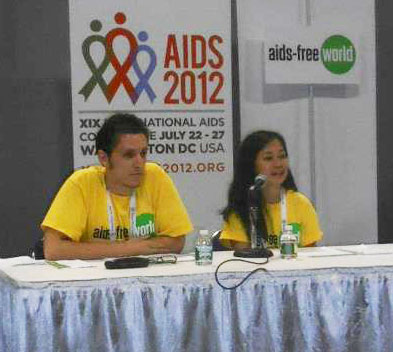Brief Report on Disability & HIV Leadership Forum
22 – 27 July 2012
Gallaudet University, Washington D.C and the 19th International AIDS Conference
Walter E. Washington Convention Centre, Washington DC

DRPI Regional Officers, Rados Keravica for Eastern Europe (left) and Chona Sabo for Asia Pacific (right) take the lead during their press conference
The Disability Rights Promotion International (DRPI) Regional Officers Chona Sabo (for Asia Pacific) represents Youth with Disabilities in Thailand and Rados Keravica (for Eastern Europe) represents Youth with Disabilities in Serbia - attended a full-day advocacy training “Disability and HIV Leadership Forum” organized by AIDS-Free World immediately preceding AIDS 2012, the “19th International AIDS Conference” in Washington, DC. The Forum brought together disability rights advocates, activists, students, organizers and leaders from around the world, including the countries of Barbados, Ethiopia, Guyana, Jamaica, Kenya, Malaysia, Mali, Mongolia, Namibia, Nepal, Rwanda, Serbia, Sudan, Tanzania, Thailand, Uganda, United States, Uruguay, Zambia and Zimbabwe. The forum, presented in collaboration with Disabled Peoples’ International (DPI) and Gallaudet University, united young disability rights leaders with seasoned advocacy experts in the fields for HIV, disability rights and human rights.
The forum provides a venue to exchange ideas and experiences among the pioneers and young leaders from different countries around the globe. Through this forum, AIDS-Free World gives a chance to the pioneers in passing the torch to young activists who are fully equipped to lead the struggle for inclusion of people with disabilities in the global AIDS movement. They are the young activists who have boundless potential, but who’ve been given few opportunities to develop the advocacy skills that can transform raw energy, ideas and passion into successful strategies for social change. An excellent opportunity to help the next generation to lead the global disability rights movement. This one day event leads these young advocates to be more active and participative in claiming their unseen rights as a person. The change from being a dreamer to a noise maker and from aiming to doing concrete actions enables them to shout out and spread the need to be included in the global Aids movement. Their voices created The Washington DC Declaration PLUS: Including the Invisible 15 Percent.
An interactive exercise brings forth the skills of these young leaders to participate and represent the 15% of the world’s population (Persons with Disabilities) at the 19th International Aids Conference which runs from 22nd to 27th of July 2012. All throughout the week, these young leaders’ steps out from their shadows and networked among HIV advocates, policy makers, and session panelists. They mainstream disability issues by asking specific questions at symposiums about the lack of inclusion of disability rights and in almost every situation; they were given uninformed or incorrect responses. Within that large crowd in the conference and given their ignorance to disability issues, they feel invisible, but that doesn’t stop them from throwing rocks of questions. They are even moved to ring the bells by presenting their 10 demands through their press conference, presenting their declaration to inform journalists about the serious need for inclusion of people with disabilities in HIV response.
The collected voice put into words in the declaration, the worth gaining skills at the forum, the meaningful experiences they had and with the torch in their hands, they are determined to keep the fire burning until it burns out the discrimination, stigma and isolation of people with disabilities from key affected populations in this fast emerging HIV/AIDS epidemic.
Chona Sabo, DRPI Regional Officer for Asia Pacific also delivered a presentation entitled “Youth Perspective on Mainstreaming Disability into HIV Programs” as one of the speaker in the workshop “Integrating Comprehension and Advocacy: How the disability and HIV rights movements can support each other at the country-level” organized by UNAIDS and the Canadian Working Group HIV and Rehabilitation.
